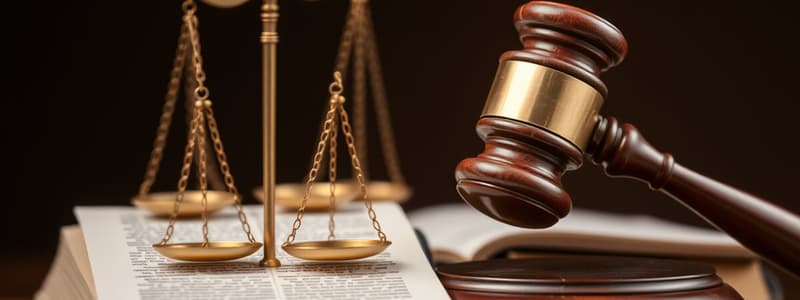Podcast
Questions and Answers
Which of the following best describes the distinction between felonies and misdemeanors?
Which of the following best describes the distinction between felonies and misdemeanors?
- Felonies carry severe penalties, while misdemeanors carry lighter penalties. (correct)
- Felonies are primarily punishable by community service.
- Felonies are less serious offenses than misdemeanors.
- Felonies include only non-violent crimes.
What does the term 'actus reus' refer to in criminal law?
What does the term 'actus reus' refer to in criminal law?
- The mental intention behind committing a crime.
- The punishment prescribed for an offense.
- The legal defenses available to a defendant.
- The physical act of committing a crime. (correct)
Which of the following is NOT a component of the corrections system?
Which of the following is NOT a component of the corrections system?
- Jails
- Probation
- Prisons
- Community Service Orders (correct)
What role do federal agencies, such as the FBI, primarily fulfill?
What role do federal agencies, such as the FBI, primarily fulfill?
Which statement correctly defines the concept of 'probation' in corrections?
Which statement correctly defines the concept of 'probation' in corrections?
Which of the following best describes the focus of biological theories of crime?
Which of the following best describes the focus of biological theories of crime?
Which of the following processes follows an arrest?
Which of the following processes follows an arrest?
What is the primary purpose of rehabilitation programs within the corrections system?
What is the primary purpose of rehabilitation programs within the corrections system?
In law enforcement, what does 'probable cause' refer to?
In law enforcement, what does 'probable cause' refer to?
Which of the following best describes 'infractions' in criminal law?
Which of the following best describes 'infractions' in criminal law?
What is the primary distinction between felonies and misdemeanors in criminal law?
What is the primary distinction between felonies and misdemeanors in criminal law?
Which of the following is a goal of the corrections system?
Which of the following is a goal of the corrections system?
What is a common legal defense that can absolve a defendant of liability?
What is a common legal defense that can absolve a defendant of liability?
In the context of corrections, what does 'parole' refer to?
In the context of corrections, what does 'parole' refer to?
What does 'mens rea' signify in the legal context?
What does 'mens rea' signify in the legal context?
Which term describes minor violations typically punishable by fines?
Which term describes minor violations typically punishable by fines?
What role do corrections facilities primarily serve?
What role do corrections facilities primarily serve?
What is the main focus of law enforcement agencies?
What is the main focus of law enforcement agencies?
Which of the following describes 'rehabilitation' within the corrections system?
Which of the following describes 'rehabilitation' within the corrections system?
What is the primary role of sheriff's departments?
What is the primary role of sheriff's departments?
What is one of the main strategies used in community policing?
What is one of the main strategies used in community policing?
Which of the following functions involves taking legal action against suspected criminals?
Which of the following functions involves taking legal action against suspected criminals?
Which agency is mainly responsible for enforcing laws on state highways?
Which agency is mainly responsible for enforcing laws on state highways?
What is a significant challenge faced by law enforcement agencies?
What is a significant challenge faced by law enforcement agencies?
Which of the following is NOT a function of law enforcement?
Which of the following is NOT a function of law enforcement?
What is the primary purpose of patrols conducted by police?
What is the primary purpose of patrols conducted by police?
Federal agencies like the FBI mainly handle which type of crime?
Federal agencies like the FBI mainly handle which type of crime?
Study Notes
Criminal Law
- Definition: Body of law that defines criminal offenses and prescribes punishments.
- Types of Crimes:
- Felonies: Serious crimes (e.g., murder, robbery) with severe penalties.
- Misdemeanors: Less serious offenses (e.g., petty theft) with lighter penalties.
- Infractions: Minor violations (e.g., traffic tickets) usually punishable by fines.
- Key Concepts:
- Mens Rea: The mental state or intent behind committing a crime.
- Actus Reus: The physical act of committing a crime.
- Defenses: Justifications (e.g., insanity, self-defense) that can absolve or mitigate liability.
Law Enforcement
- Role: Enforce laws, maintain public order, prevent and investigate crimes.
- Agencies:
- Local Police: Handle community policing and minor offenses.
- State Police: Enforce state laws and assist local agencies.
- Federal Agencies: Handle federal law enforcement (e.g., FBI, DEA).
- Processes:
- Investigation: Gathering evidence, interviewing witnesses, and arresting suspects.
- Arrest: Legal seizure of a person suspected of committing a crime, requiring probable cause.
- Booking: Administrative process following an arrest, including fingerprinting and documentation.
Corrections
- Purpose: Manage offenders convicted of crimes, rehabilitate, and reintegrate them into society.
- Components:
- Prisons: Long-term confinement for serious offenders.
- Jails: Short-term detention for minor offenses or pre-trial holding.
- Probation: Supervised release instead of incarceration, with conditions.
- Parole: Early release from prison, subject to supervision and conditions.
- Rehabilitation Focus: Programs aimed at reducing recidivism, including education and vocational training.
Theories Of Crime
- Biological Theories: Focus on genetic and physiological factors that may predispose individuals to criminal behavior.
- Psychological Theories: Examine mental processes and behavioral patterns that influence criminality (e.g., personality disorders).
- Sociological Theories:
- Strain Theory: Suggests crime occurs when individuals cannot achieve societal goals through legitimate means.
- Social Learning Theory: Proposes that criminal behavior is learned through interactions with others.
- Labeling Theory: Argues that being labeled as a criminal can lead to further criminal behavior.
- Routine Activities Theory: Crime occurs when a motivated offender encounters a suitable target without capable guardianship.
Criminal Law
- Body of law defining criminal offenses and outlining punishments for violations.
- Felonies: Serious crimes such as murder and robbery, typically resulting in severe penalties including long prison sentences.
- Misdemeanors: Less serious offenses like petty theft, generally punished by fines or short jail terms.
- Infractions: Minor violations, such as traffic tickets, punishable usually by fines only.
- Mens Rea: Refers to the intent or mental state of the individual committing a crime.
- Actus Reus: The actual physical act or conduct that constitutes a criminal offense.
- Defenses: Legal justifications that can mitigate or absolve liability, including insanity and self-defense claims.
Law Enforcement
- Law enforcement agencies are responsible for enforcing laws, maintaining public safety, and investigating crimes.
- Local Police: Focus on community policing and managing minor offenses within neighborhoods.
- State Police: Enforce state laws, providing assistance to local police when needed.
- Federal Agencies: Handle enforcement of federal laws; notable examples include the FBI and DEA.
- Investigation: The process involves collecting evidence, interviewing witnesses, and gathering information to support legal prosecution.
- Arrest: A legal action to seize a person suspected of committing a crime, requiring probable cause to ensure legal grounds.
- Booking: A process following an arrest that involves fingerprinting and documenting personal details and charges of the suspect.
Corrections
- Corrections encompass management of convicted offenders, focusing on rehabilitation and reintegration into society.
- Prisons: Facilities for long-term confinement of individuals convicted of serious crimes.
- Jails: Short-term detention for individuals arrested for minor offenses or those awaiting trial.
- Probation: A court-ordered period of supervised release instead of serving time in prison, often with specific conditions imposed.
- Parole: Early release from prison under supervision, subject to compliance with certain conditions.
- Rehabilitation Focus: Correctional programs aim to reduce recidivism through education, vocational training, and life skills development.
Theories Of Crime
- Biological Theories: Suggest that physiological and genetic factors can influence predisposition to criminal behavior.
- Psychological Theories: Investigate the role of mental processes and behavioral patterns, including traits like personality disorders, in contributing to criminal activity.
- Sociological Theories:
- Strain Theory: Posits that crime occurs when individuals cannot achieve societal goals using legitimate means.
- Social Learning Theory: Suggests that criminal behaviors are learned from interaction with others and social environments.
- Labeling Theory: Proposes that being labeled as a criminal can perpetuate further criminal behavior due to societal stigma.
- Routine Activities Theory: Asserts that crime happens when a motivated offender finds a suitable target without adequate guardianship.
Criminal Law
- Criminal law defines offenses and prescribes penalties for those who break the law.
- Felonies involve serious offenses like murder or robbery, typically resulting in over a year of imprisonment.
- Misdemeanors are less serious, such as petty theft, generally leading to fines or less than a year of jail time.
- Infractions refer to minor offenses, like traffic violations, punishable primarily by fines.
- Mens Rea indicates the mental state of the offender at the time of the crime, including levels like intentional, reckless, or negligent.
- Actus Reus refers to the physical act of committing a crime.
- Legal defenses can include insanity claims or self-defense arguments that may absolve a defendant from liability.
- Criminal Procedure encompasses various stages from investigation to trial, including arrest, charges, arraignment, trial, and ultimately sentencing.
Corrections
- The corrections system manages individuals convicted of crimes, focusing on both confinement and rehabilitation.
- Prisons serve for long-term incarceration of felons, while jails are designed for short-term stays of misdemeanants and pre-trial detainees.
- Probation is court-ordered supervision that allows offenders to remain outside of prison under specific conditions.
- Parole enables early release from prison under supervision, following a period of sentence served.
- Key goals of corrections include:
- Rehabilitation: reforming offenders to prevent reoffending.
- Deterrence: using punishment to discourage criminal acts.
- Incapacitation: removing offenders from society to prevent further crimes.
- Restoration: focusing on repairing harm, often through victim restitution.
Law Enforcement
- Law enforcement consists of agencies and officers tasked with maintaining order, enforcing laws, and crime prevention.
- Local Police operate within municipalities to enforce laws at the city level.
- Sheriff's Departments function at the county level, often managing jails and rural law enforcement tasks.
- State Police/Highway Patrol ensure law enforcement on state highways and assist local law enforcement agencies.
- Federal Agencies (like the FBI and DEA) focus on enforcing federal laws and specific crime-related issues.
- Primary functions of law enforcement include:
- Patrol: active monitoring to prevent crime.
- Investigation: collecting evidence and probing criminal activities.
- Arrest: capturing individuals suspected of crimes.
- Community Policing: fostering relationships with community members to enhance safety and trust.
- Current challenges in law enforcement include police misconduct, relations with the community, and the delicate balance between law enforcement and civil liberties.
Studying That Suits You
Use AI to generate personalized quizzes and flashcards to suit your learning preferences.
Description
This quiz covers the essential elements of criminal law, including definitions, types of crimes, and key concepts such as mens rea and actus reus. It also explores the role of law enforcement agencies and their responsibilities in maintaining public order. Test your understanding of these critical aspects of the legal system.



